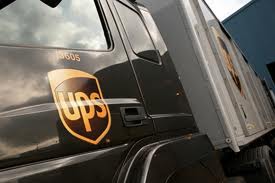UPS delivers greener fleet for London Olympics using Bio-Fuel
 Global delivery service UPS has called for a drastic increase in the supply of biofuel from waste, after revealing plans to add 10 biomethane trucks into its UK fleet for the London Olympic Games.
Global delivery service UPS has called for a drastic increase in the supply of biofuel from waste, after revealing plans to add 10 biomethane trucks into its UK fleet for the London Olympic Games.UPS unveiled a plan late last week to help deliver the 30 million items required to create this summer’s Games, ranging from medals for the winning athletes, to 18,000 wardrobes and beds for the Olympic Village, and computers for the organisers.
To help ensure the Games are the “greenest games ever” UPS has added to its fleet 10 Mercedes dual-fuel biomethane diesel trucks, 20 plug-in electric and three hybrid cars. It will also run a trial sailing barges down the Thames to help ease congestion on the capital’s busy roads.
Speaking to BusinessGreen on the sidelines of an event in London, Peter Harris, EMEA director of sustainability for UPS, said the Olympics contract had significantly boosted its research and development programme for low carbon technology.
The company has been testing the biomethane trucks from its Tilbury depot since November last year, after they were converted by Nottingham-based Hardstaff Group.
The dual-fuel trucks each cost around £30,000 more than a traditional diesel truck. They will initially be powered by an equal mixture of diesel and liquid methane fuel derived from organic landfill sites. But Harris said it hopes to eventually power the fleet solely on biofuel.
 He explained each unit of biomethane would cut emissions well-to-wheel by at least 70 per cent compared to diesel, and would reduce tailpipe emissions by 20 per cent compared to diesel.
He explained each unit of biomethane would cut emissions well-to-wheel by at least 70 per cent compared to diesel, and would reduce tailpipe emissions by 20 per cent compared to diesel.He added that the benefit could be even greater given that the displaced methane would have been more harmful to the atmosphere than the carbon emissions which replace it.
“We think biomethane is potentially a really exciting fuel,” he said. “It’s one of the few alternative fuels that can work at the heavy end of vehicle spectrum. It has great potential for reducing carbon because the fuel is generated from producing waste.
“This is a little understood thing but it’s close to miraculous if you think about it because the win-win opportunities that exist from number one: reducing the amount of waste that we’ve generated and number two: then turning that into a truck fuel.”
However, he warned that UPS’ ambition could be derailed by the short supply of fuel. Gasrec in Surrey is currently the only UK supplier of biomethane from landfill gases.
Coca-Cola Enterprises is set to launch 14 new gas-powered Iveco Stralis delivery trucks from its North London depot this summer, also using fuel from Gasrec.
“We urgently need an expansion of this industry. There’s no doubt about it,” he said.
“We’re working with EU and national government to try to increase the uptake of this technology because one of the problems we face now is that even with just 10 of these vehicles, there’s a restricted fuel supply.”
“There’s only one supplier of biomethane in the UK right now and they obviously have a limited capacity. So we want to help them and other suppliers build this into a more scalable programme for the future.”
You can return to the main Market News page, or press the Back button on your browser.

